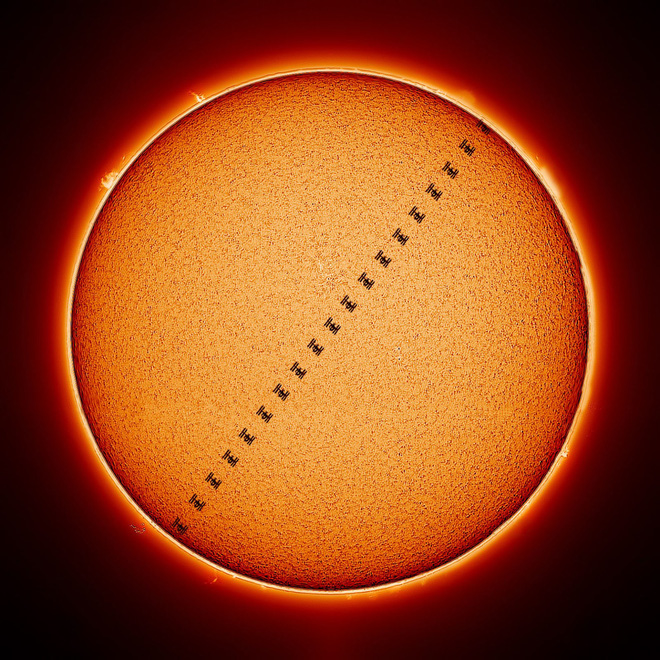Impressive image: ISS International Space Station flies over the Sun.
The kit that Murdoc used to take a lifetime photo that you can see below includes: ZWO ASI120 Monochrome camera with SOLARMAX II 90MM DOUBLE STACK telescope at 800mm focal length, mounted on GoTo computer mount Orion Atlas EQ-G.
" Wow, I honestly can't believe I took this picture, " Murdoc wrote. " It's amazing to know that such a thing can still be done ."
To take pictures, Murdoc carefully planned everything before going to the desert for an hour, hoping to capture an event that took only 0.2 seconds - even Faster than even a blink of your eye.
" You need to know when ISS will pass by the Sun, then find the exact coordinates and altitude that you yourself will be in a straight line with ISS and the Sun, " Murdoc said. " And let me tell you, you can move the position in about half a mile, if you stand too far the ISS will deviate to one side, or you will completely miss it ."
Once you have identified these details, you will have to arrive at the right place and get your equipment ready before G to ensure everything you can control is in a state of readiness.

The international space station ISS flew over the Sun captured by Murdoc
" The space station moves at 28,163 km / h, so to go from one side of the Sun to the other, the ISS takes only exactly 0.5 seconds, " Murdoc said. " With the field of view on my camera and lens, actually only 0.2 seconds. "
When the time comes, you have to start pressing the exposure button as fast as you can, praying to God that all your calculations and all previous preparations are right.
" By now, you know exactly the time in milliseconds when the ISS will pass by, " the photographer said. " You started counting down 10-9-8-7-6-5-4-3-2-1-0, now you are pressing the exposure button, in case it comes sooner or later, and eagerly look at your computer screen as it outputs each frame result to you ".
And if you're lucky enough to get an ISS image across the Sun like Murdoc's, all your efforts have paid off. You can refer to this photographer's Facebook or Instagram for more details.
You should read it
- ★ How clean are astronauts keeping the space station?
- ★ The 7 largest objects people ever launched into space
- ★ What's special about supercomputers that survived 1 year on ISS International Space Station?
- ★ There will soon be a 'green vegetable garden' on the International Space Station (ISS)
- ★ Why does SpaceX send the deadly virus to the International Space Station?